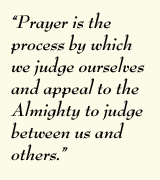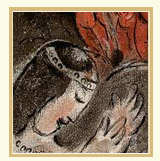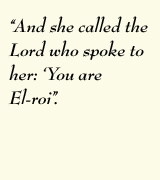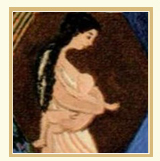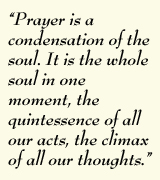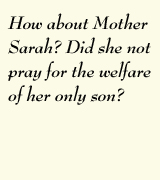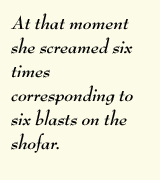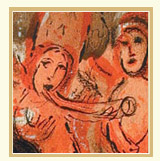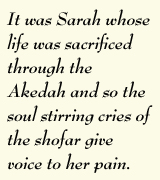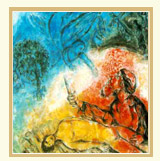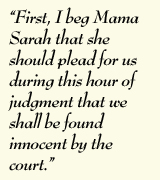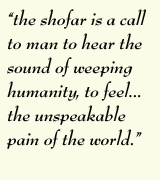Sarah’s Voice
Introduction
Sarah, the first of the mothers, is introduced to the reader by way of her barrenness. “And Sarai was barren she had no child” (Gen. 11:29). The emphatic nature of the description intimates that, in large measure, her future was to be molded by this fact. However, Sarah is singled out in other ways. She is the first and only matriarch whose name is changed, the only one according to the rabbis who has direct communication with God[1]Genesis Rabbah 45:10: cf. almost identical formulation in Genesis Rabbah 63:7 regarding God’s communication with Rebecca and the only one whose age is disclosed at her death. Sarah stars in no less than four biblical episodes—two as subject (Gen 16/21) in which she determined the fate of Hagar her handmaid, and two as object (Gen. 12/20) in which she is taken from her husband.
The first two stories involve her hand maiden Hagar. After Sarah resigns herself to barrenness, her voice is heard for the very first time:
“And Sarai said to Abram, “Look, the Lord has kept me from bearing. Consort with my maid; perhaps I will be built through her.”
(16:2)
Her words are telling ‘perhaps I will be built through her’. By giving her Egyptian handmaiden Hagar to Abraham as a concubine Sarah hoped that she would conceive as well. Although magnanimously sharing her husband with her servant would enable Abraham to sire an heir, the emotional turmoil for Sarah was no doubt grueling. She was forced to accept resignation and relinquish control. Sarah’s courageous action required transcending self and in this regard it introduced a fundamental aspect of prayer. Sarah engaged in a process of soul searching and self-discovery. She sought to broaden her understanding of her role in the family of Abraham. Perhaps at this juncture she underwent what Heschel calls ‘a moment of prayer’:[2]This notion is further developed by Shalom Carmy: The gesture of prayerful petition affects us by redeeming from nescience our hidden hopes and visions. Praying, we do not manipulate God, nor do we withdraw all desire for the fulfillment of our legitimate needs. We strive to discover, in dialogue with God, through the unique verbal enterprise defined as prayer, what our needs truly are, no more and no less than God’s will for us.
Carmy, Shalom, “Destiny, Freedom, and the Logic of Petition.” Tradition 24(2) (Winter 1989): p. 21
What takes place in a moment of prayer may be described as a shift of the center of living – from self-consciousness to self-surrender.
(The Insecurity of Freedom,(NY 1972) p 255.)
Sarah did not pray but rather laid a cornerstone of prayer. Her discourse was with Abraham and not with God, but the personal process she underwent involved an attempt to arrive not only at an understanding of what her needs were, but to comprehend what God’s will for her entailed. Perhaps discussing the matter with her husband rather than with God Himself is what yielded subjectivity, and caused her good intentions to be affected by her own suffering. Her outburst unleashed anger and resentment, and ultimately caused her to send Hagar away.
And Sarai said to Abram, “The wrong done me is your fault! I myself put my maid in your bosom; now that she sees that she is pregnant, I am lowered in her esteem. The Lord judge between you and me!
(16:5)
In Hebrew the word to pray — lehitpalel is the reflexive form of the verb meaning to judge. Prayer is the process by which we judge ourselves and appeal to the Almighty to judge between us and others. Although there is clearly no prayer on Sarah’s lips in this encounter, there may be a rudimentary form of prayer in the murmurings of her heart. In the words of the liturgist: “Preparation of the heart comes from human beings but the gift of speech comes from God.” (from the Areshet Sefatenu prayer of the High Holidays)
Hagar’s Tear
How befitting that Sarah’s actions set in motion the next movement of prayer. This time the interchange was between Hagar and the angel of the Lord. Again there was no direct prayer voiced by Hagar. She did not ask or plead. An angel of God found her by a spring of water in the wilderness, in a state of despair and confusion. The angel engaged her in dialogue, providing answers that allow us to deduce what her questions must have been. Hagar was alone, cast out of her home and separated from the father of her child. What was to become of her and her unborn baby? The doubts, fears, and pain in her heart were responded to by God who, through His messenger, informed her that her child would be called Ishmael (Hebrew meaning, God will hear) for God had paid heed to her suffering.
An angel of the Lord found her by a spring of water in the wilderness, the spring on the road to Shur, and said, “Hagar slave of Sarai, where have you come from and where are you going? And she said, “I am running away from my mistress Sarai.’ And the angel of the Lord said to her, Go back to your mistress and submit to her harsh treatment And the angel of the Lord said to her. “I will greatly increase your offspring, And they shall be too many to count.” The angel of the Lord said to her further Behold you are with child and shall bear a son. You shall call him Ishmael, For the Lord has paid heed to your suffering. He shall be a wild ass of a man. His hand against everyone, and everyone’s hand against him He shall dwell alongside of all his kinsmen. And she called the Lord who spoke to her, “You are El-roi, by which she meant, Have I not gone on seeing after He saw me! Therefore the well was called Beer lahai roi, it is between Kadesh and Bered. Hagar bore a son to Abram and Abram gave the son that Hagar bore him the name Ishmael.
(16:7-15)
Hagar’s understanding of the divine visitation, is encapsulated in her exclamation: “And she called the Lord who spoke to her. You are El-roi, by which she meant, have I not gone on seeing after He saw me!”
The 15th c Italian commentator Rabbi Obadiah Seforno explains:
And she called the Lord. Calling the name of God is prayer, that contains praise of the Holy One Blessed be He in the mind of the supplicant and in his words, as they (the Rabbis) of blessed memory said, “Let one always first arrange the praise of God and then pray. In this regard the supplicant will concentrate on God as it says, “I have placed God before me always…So too when she (Hagar) prayed she set out the praise of the God who spoke with her saying, “You are the seeing God, the God who sees all, not just in the house of Abraham, as they (the Rabbis),[3]Baba Metzia 59a said, all of the gates are locked excepting the gates of through which pass the cries of someone who has been wronged.[4]Gen. 16:13
This step toward communication with God constitutes the very bedrock of prayer.
Sarah’s Joy
After the birth of Ishmael, Sarah’s barrenness was even more pronounced. It was years until she was blessed with a son of her own at which point, her voice was heard in prayer.
The Lord took note of Sarah as He had promised, and the Lord did for Sarah as He had spoken. Sarah conceived and bore a son to Abraham in his old age, at the set time of which God had spoken. Abraham gave his newborn son, whom Sarah had borne him, the name Isaac. And when his son Isaac was eight days old, Abraham circumcised him, as God had commanded him. Now Abraham was a hundred years old when his son Isaac was born to him. Sarah said,
“God has brought me laughter; everyone who hears will laugh with me.” And she added,
“Who would have said to Abraham
That Sarah would suckle children!
Yet I have borne a son in his old age.”
(Gen. 21:1-7)
Sarah’s story is one of overwhelming joy. We may easily imagine her astonishment and excitement at becoming a mother for the first time at the age of ninety. She laughs like a young girl at her good fortune, gladdened and rejuvenated. Having been granted her wish, Sarah sings a song of rejoicing Her words are an overture to prayer. They are not explicitly directed heavenward but acknowledge with exultation the divine intervention in her life. Rashi describes Sarah’s heartfelt words as a form of prayer:
And she said, Who (Mi) would have declared unto Abraham, that Sarah should have suckled children! The word Mi is used as an exclamation of praise alluding to the distinguished position of the Being spoken of. The sense therefore is: See Who it is, and to what extent He keeps his promise! The Holy One, blessed be He, promises and performs!
(Rashi: Gen 21:7 )
Sarah’s Heartache
We next hear Sarah speak after Isaac is weaned. It is at this juncture that prayer as a form of seeking judgment is demonstrated. Isaac was Sarah’s first child, but Abraham’s second. With Isaac’s birth, all of Sarah’s maternal instincts, which long lay dormant, surfaced and reshaped her perceptions of everything around her. At the celebration of Isaac’s weaning, Sarah decided that action must be taken. Ishmael’s antics, which previously were seen as harmlessly amusing, became a threat, a looming detrimental influence on the apple of her eye. She confronted Abraham with a harsh demand.
Sarah saw the son whom Hagar the Egyptian had borne to Abraham playing. She said to Abraham: “Cast out that slave-woman and her son, for the son of that slave shall not share in the inheritance with my son Isaac.”
(Gen. 21:9-10)
To contemporary ears, this sounds like a cruel and heartless move. In an effort to soften its callousness, scholars have suggested that Sarah’s request that Hagar and Ishmael be sent away was precipitated by a conflict over inheritance rights.[5]See Rembrandt’s banishment of Hagar and Ishmael. In ancient Mesopotamia, freeing a maidservant disqualified any son she had borne to the master of the house from inheriting his estate. So when Sarah said: “for the son of that slave shall not share in the inheritance with my son Isaac,” she was simply asking Abraham to carry out a legal procedure which would cause Ishmael to forfeit his right to inheritance.
However, the action was terribly painful and we are immediately informed: “The matter distressed Abraham greatly, for it concerned his son” (Gen. 21:11). The simple meaning of the verse is stark and moving. “The matter distressed Abraham greatly, for it concerned his son.” Abraham was crestfallen. Even if Sarah’s intuitions were correct, how could he banish his own first-born child? Sarah did not implore God through prayer. She demanded action. One is left wondering about all of her unstated thoughts and feelings with which she struggled, regarding the future of her son, the fate of her handmaiden and of the son of Abraham. It was these thoughts and feelings that fueled her vehemence and caused her to cry out. Might this constitute the basis for prayer?
Prayer is more than a cry for the mercy of God. It is more than a spiritual improvisation. Prayer is a condensation of the soul. It is the whole soul in one moment, the quintessence of all our acts, the climax of all our thoughts.
(Insecurity of Freedom (NY 1972),pp. 254-255)
In this regard, Sarah’s plea: “Let not the son of the hand maiden inherit with my son Isaac!” can be understood not merely as a legal demand. It was a sub-conscious request that God determine the course of events with a degree of objectivity and justice beyond human capabilities? Clearly, Sarah operated on a human level and did not direct her demand heavenward, however God heeded her cry. The impasse caused by the divergent feelings of Sarah and Abraham was resolved by the Almighty. “But God said to Abraham, Do not be distressed over the boy or your slave, whatever Sarah tells you, harken unto her voice, for it is through Isaac that your offspring shall be continued” (Gen. 21:12). This verse encapsulates the dimension of prayer as a form of judgment. The fate of Isaac and Ishmael hung in the balance, and God rendered His verdict. He not only decided in favor of the prosecution, he offered an explanation of His decision. Sarah’s inner voice was heard and validated, ensuring the continuity of the covenant. Sarah’s experience laid another corner stone of prayer.
The purpose of prayer is to be brought to God’s attention to be listened to, to be understood by God; not to know Him, but to be known to Him.
(Abraham Joshua Heschel, Man’s Quest for God (NY 1954)p.10.)
Akedat Yitzhak: Piercing the Silence
The most chilling episode in the lives of Sarah and Abraham is the story of the binding of Isaac – Akedat Yitzhak. Given the enormity of the trial and the fear of the impending loss of their only son Isaac, the reader is stunned by the silence that haunts the biblical narrative. Where are the thoughts and feelings of the characters involved? Erich Auerbach suggests a literary resolution of the problem:
The journey is like a silent progress through the indeterminate and the contingent, a holding of the breath, a process which has no present, which is inserted, like a blank duration, between what has passed and what lies ahead.
(Erich Auerbach, “Odysseus’ Scar,” in Mimesis: The Representation of Reality in Western Literature (Princeton: Princeton University Press, 1969), p. 10).
Additionally, the silence in the text may connote the total acquiescence and obedience on the part of Abraham the knight of faith. Unflinchingly, he sets off to fulfill the will of God, sacrificing all of his thoughts and feelings along the way.
However, one wonders why Father Abraham did not pray to have this decree averted. His consternation at the banishment of Ishmael is recorded in the Bible. Was he not dismayed by the thought of losing his son Isaac? Midrashic texts describe Abraham’s pangs of conscience at taking the life of his beloved Isaac. They also pipe in his confusion and doubt about the reliability of God’s promises given the sacrifice he was about to offer. However, even in the context of midrash Abraham’s prayers are left unvoiced.
How about Mother Sarah? Did she not pray for the welfare of her only son? The possibility exists that she was unaware of what was going on. We are told that father and son took off at the crack of dawn. Perhaps Abraham’s early departure obviated the need for explanation. Midrash Tanhuma suggests that Abraham used an excuse to spare Sarah the pain:
Abraham said, “What am I to do? If I reveal [my intention] to Sarah women’s minds are light upon them in small matters, how much more so in a large matter such as this! But if I don’t reveal [anything] to her and steal him away, then when she doesn’t see him, she will kill herself!” What did he do? He said to Sarah, “Prepare for me food and drink so that we may eat and drink and be happy.”… While they were eating , he said to her, “You know, when I was three years old, I recognized my Creator, and this lad has grown up and has not been educated. There is one place a bit far from us where lads are instructed. I will take him and have him taught there.” She replied, “Go in peace.”
(Tanhuma B Gen 22)
Such contentions presume that the Akedah took place far from Sarah’s home and even further from her consciousness. An alternate exegetical possibility is that Sarah was fully aware. Saadia Gaon suggests that the trial of the Akedah was a trial for Sarah as well as Abraham. He posits that she too withstood the challenge of transcending selfhood and motherhood. Similar to Abraham her spiritual fortitude is communicated through the power of her silence.
The third possibility is that she was silenced forever by the trauma of the Akedah. She may not have fathomed the enormity of the crisis when Abraham and Isaac left that morning for Mount Moriah, however when Isaac returned with the report of what had happened, Sarah, according to the Rabbis, let out a shriek that took her soul away and brought about her death . Her cry was transformed for all eternity into prayer of a broken heart.
“And Sarah died in Kiryat Arba.. and Abraham came to mourn Sarah and to weep for her” From where did [Abraham] come? From Mt. Moriah, for Sarah died from that pain.
(BR 58:5)
Sarah’s Shofar
When Isaac returned to be with his mother, she said to him, “Where have you been, my son? He replied, “My father took me up mountains and down valleys, and took me up one of the mountains built an altar, arranged the wood, prepared the offering-place, and took the knife to slaughter me, and an angel called to him [to stop]. And she said, “Woe unto my son! Were it not for the angel you would have already been slaughtered? To which he answered, “Yes.” At that moment she screamed six times corresponding to six blasts [on the shofar]. (Leviticus Rabbah 20:2)[6]An alternate version of this midrash is found in Pirke d’Rabbi Eliezer 72b:When Abraham returned from Mt. Moriah, Satan was angry when he saw that he had failed to realize his desire to stop Abraham’s sacrifice. What did he do? He went and said to Sarah, “Oh Sarah! Have you not heard what has happened?” She said to him, “No.” So he told her, Your old husband took the lad, Isaac, and brought him for a burnt offering, and the lad was crying and wailing that he could not be saved.” Immediately she began to cry and wail. She cried three cries corresponding to three blasts [on the shofar], and three wails corresponding to three ululations [of the shofar]. And her soul took flight and she died.” Cf. “The Dual Nature of Prayer” in ed. Arnold Lustiger, Before Hashem You shall be Purified: Rabbi Joseph B. Soloveitchik on the Days of Awe, (NJ., 1998), pp. 23-25.
In this midrashic rendition Sarah’s wailing is immortalized through the blasts of the shofar. Let us consider the powerful message communicated by this analogy.
Many explanations are offered for the blowing of the shofar on Rosh Hashannah. The shofar announces the coronation of God as King of the Universe, it reminds us of the revelation at Sinai. It is a call to repentance and a foreshadowing of the final day of judgment. What is relevant to our discussion is that the shofar of Rosh Hashannah harks back to the Akedah.
Rabbi Abahu said: Why do we blow a ram’s horn? The Holy One Blessed Be He said, “Blow a ram’s horn before me so I may recall the ‘Binding of Isaac’ son of Abraham and credit you as if you bound yourselves upon the altar.
(Rosh Hashanna 16a)
The shofar, therefore, reminds us of the ram Abraham offered as a sacrifice in place of his son Isaac. It serves as a symbol of heroic faith and ultimate devotion.
This classic explanation relates to Abraham’s sacrifice on Mount Moriah. Yehudah Gelman adds an additional dimension. He connects the shofar to the respective roles played by both Abraham and Sarah in the Akedah.[7]The ram’s horn, the horn of Abraham’s ram, represents the sacrificial perseverance of Abraham, a perseverance undefeated in spirit: “Master of the Universe,” Abraham once said, “Look upon the blood of this ram as though it were the blood of Isaac my son, and its innards as though they were the innards of Isaac. In taking the ram’s horn therefore, we present before God the sacrificial merits of Father Abraham, and the sacrificial merits of his innocent children, commemorating their readiness though out the ages to sacrifice themselves and all that is dear to them for the Holy Name of God. In taking the shofar, we children of Abraham arouse hesed, the sacrificial consciousness, in the face of God’s judgment, God’s din, in the Days of Judgment.
Through the sounding of the ram’s horn, however, we children of Sarah are engaged in a very different spiritual enterprise. For we are bringing before the Heavenly Throne a different religious consciousness, one which does not participate in the sacrificial and self-negational. We children of Sarah turn to God pleading that He rescind His demands for sacrifice that have accompanied us through our long and sorrowful history. And we do so with the wails and cries of our Mother Sarah. We confront God’s judgment (din) within the attribute of din itself. We ask God to recognize the validity of Sarah’s agony and to spare her children.
The shofar thus incorporates a twin spiritual consciousness, one of hesed and one of din, two religious ideals, one embodied in the sacrificial life of Father Abraham, Sacrificial Man, and the other embodied in the life of Mother Sarah, who died from her pain over the binding of Isaac.
Mother Sarah has bequeathed to us the power to wail and cry through the very same ram’s horn which we brandish as a reminder of Abraham’s sacrificial devotion. She gave to us her death, to be recalled again and again in sorrow, together with the celebration of the sacrificial consciousness of our Father Abraham.
P65-66 “And Sarah Died” Yehuda Gellman, Tradition 32/1 (1997)
The connection of Sarah with the shofar is integrally connected to the service of the heart (the avodah shebalev) in which Sarah engaged. Louis Jacobs sums up the idea as follows:
The mystics have their own interpretation of the shofar; they use the illustration of a lover serenading his beloved. Israel seeks to awaken the divine love and to link the higher and lower worlds. Others speak of the shofar sounds as a prayer without words. There is a longing in the human soul too deep to be conveyed in speech, which finds expression in the yearning notes of the shofar.
(Rabbi Louis Jacob, Guide to Rosh Hashannah)
Prayers Of a Broken Heart
This notion is encapsulated in a story told of the Baal Shem Tov. One year he appointed his student Rabbi Zeev Kitzes to assist him in reading the notes of the shofar, as he blew. R. Zeev was awe struck by the responsibility and made sure to write down in consultation with his master all of the exalted kabbalistic ideas and intentions that he should focus on while the shofar was being blown. Rosh Hashannah arrived and the time of the blowing of the shofar was upon them. R. Zeev suddenly discovered that the paper with all of the sacred instructions was missing. He was devastated. How could he ever forgive himself for such negligence? At that very moment, the Baal Shem Tov entered the synagogue, lifted his shofar, and began to blow. Heart broken, R. Zeev recited the sequence of notes without any of the exalted ideas, certain that he had disappointed his master.
At the end of the service the Baal Shem turned to him and said. The gates of heaven have many keys. Blessed are those who possess the keys. For those who don’t, there is something more powerful than all of the keys. “What might that be?” asked R. Zeev. The Baal Shem Tov turned to him and said, “Ah, it is the power of a broken heart. The blasting of the shofar, my son, is the sound of that pain. Do not despair for when your heart broke the heavenly gates were opened.”
In Sarah’s case the blowing of the shofar commemorates not only the willingness to sacrifice but the sacrifice itself. The shofar as the symbol of Sarah post-Akedah constitutes an appeal for compassion based on the sacrifices we have made. It was Sarah whose life was sacrificed through the Akedah and so the soul stirring cries of the shofar give voice to her pain.
One year in the synagogue of Rabbi Levi Yitzhak of Berditchev the blower was unable to get a sound out of his shofar. Hard as he tried nothing happened. R. Levi Yitzhak himself mounted the podium. He tried with all his might and was unsuccessful. Finally he put down the shofar turned his eyes heavenward and said, “Master of the Universe we the children of Israel, the children of Sarah, Rivka, Rachel and Leah and want nothing more than to observe your commandments. Heed our cries. If you have decided this year to heed the cries of Ivan the Terrible so be it but know that we have given You our best efforts. He then took the shofar and tried to blow once again. This time the sound was heard. Rabbi Levi Yithak blew and blew his heart out. But it was to be the last time R. Levi would ever blow the shofar. Shortly thereafter he died.
The Merit of Sarah
In 1780, a techinah for the blowing of the shofar was written by Cyril the wife of Rabbi Mordechai Katz Rappaport of Lvov.[8]The head of the rabbinic court in Lekzenizt and the daughter of Rabbi Jacob Segal of Dubnow She used Sarah as the springboard for an appeal to God to guard and protect our children from all harm. Who if not Sarah merits such a request?
Today I stand in judgment before You and before Your tribunal. Master of the Universe, if I must stand in judgment let your attribute of mercy outweigh that of judgment. Forgive our sins… particularly now that we have heard the sounding of the shofar… cast all of our sins to the wind along with the sound of the shofar. Along with the nine blasts of the shofar, may the merits of the nine, the four mothers, the three fathers and Moses and Aaron on this day of judgment.
Since they have pleaded on our behalf.First I beg Mama Sarah that she should plead for us during this hour of judgment that we shall be released from court innocent. have mercy upon our children our mother and especially pray for our little ones that they should not be taken away from us. Since you know well what it is when a child is taken from his mother as it happened to you when Isaac was taken from you. Your son, you no doubt suffered terrible anguish. Now is the time you can pray for us because now we are blowing the shofar the horn of the ram so that G will remember the merit of Isaac who agreed to be bound upon the altar like a lamb, therefore Satan will be confused and will not be able to bring claims against us and you have the opportunity to request that the attribute of mercy be cast upon us…
(Yonadav Kaplon, Mimcha Eilecha; Machzor for Rosh Hashannah , (Israel, 2004) p. 178)
Unspeakable Pain
In a daring exegetical step Kalonymous Kalman Shapiro explains that Sarah did not lose her life as a result of the trauma of the akedah she was driven by personal anguish to take her own life.
Rashi explains why the death of Sarah is (textually) juxtaposed to Akedat Yitzhak. [He notes] that news of the Akedah caused her soul to depart and she died. Therefore Moses our Master, the Loyal Shepard placed her death near the Akedah to work in our favor and to show that through her excessive suffering she died. Moreover, if this happened to the great righteous Sarah… who couldn’t bear such suffering how much more so with us.
In addition, we might say that Sarah our Mother who took the Akedah so much to heart until her soul departed, did this for the sake of Israel to demonstrate to God that it is impossible for Israel to withstand too much suffering. Even those who by His mercies remain alive through suffering, part of their strength, their minds, and their spirits are broken and lost. There are those who die a total death and those who die a partial death.
That is the meaning of the verse the years of the life of Sarah. Ostensibly she sinned against the remainder of her years since she was intended to live on, had she not taken the Akedah so much to heart. However, because she acted for the sake of Israel the verse hints that even the [remaining] years of the life of Sarah, i.e. the years [she might have lived] after her one hundred and twenty were all equal in goodness. She did not betray them. Therefore, may God have mercy upon us and on all of Israel and redeem us speedily spiritually and physically with apparent kindness.
As the first mother of the nation, Sarah’s powerful prayers voiced and unvoiced, in life and in death resonate in the hearts and souls of her descendants throughout the ages. Louis Jacobs continues:
The shofar the wind instruments, is further said to symbolize the spiritual side of life (in Hebrew the word ruah means both “wind” and “spirit’). On Rosh Hashannah man should be aware of the demands of the spirit in the year ahead and thus awaken the higher mercies. Modern Jewish thinkers have given their interpretations of the shofar. One of the finest is Milton Steinberg’s exposition that the shofar is a call to man to hear the sound of weeping humanity, to feel what the poet calls weltschmertz, the unspeakable pain of the world, and to resolve to do battle against all those forces working for man’s oppression and subjugation to the end that the day might come when the tear is wiped from every cheek and the sigh from every lip.
There are six whose voice travels from one end of the earth to the other and their voice is not heard. When a fruit bearing tree is felled, a voice travels from one end of the earth to the other and is not heard. When the snake sloughs off its skin, a voice travels from one end of the earth to the other and is not heard. When a woman is divorced from her husband, a voice travels from one end of the earth to the other and is not heard. When a woman has relations with her husband for the first time, a voice travels from one end of the earth to the other and is not heard. When an infant leaves its mothers womb, a voice goes out from one end of the earth to the other and is not heard. When the soul leaves the body, a voice travels from one end of the earth to the other and is not heard. And the soul does not leave the body until it has seen the divine Presence as it says, “For no man shall see Me and live (Exod. 33:20 )
References
| ↑1 | Genesis Rabbah 45:10: cf. almost identical formulation in Genesis Rabbah 63:7 regarding God’s communication with Rebecca |
|---|---|
| ↑2 | This notion is further developed by Shalom Carmy: The gesture of prayerful petition affects us by redeeming from nescience our hidden hopes and visions. Praying, we do not manipulate God, nor do we withdraw all desire for the fulfillment of our legitimate needs. We strive to discover, in dialogue with God, through the unique verbal enterprise defined as prayer, what our needs truly are, no more and no less than God’s will for us.
Carmy, Shalom, “Destiny, Freedom, and the Logic of Petition.” Tradition 24(2) (Winter 1989): p. 21 |
| ↑3 | Baba Metzia 59a |
| ↑4 | Gen. 16:13 |
| ↑5 | See Rembrandt’s banishment of Hagar and Ishmael. In ancient Mesopotamia, freeing a maidservant disqualified any son she had borne to the master of the house from inheriting his estate. So when Sarah said: “for the son of that slave shall not share in the inheritance with my son Isaac,” she was simply asking Abraham to carry out a legal procedure which would cause Ishmael to forfeit his right to inheritance. |
| ↑6 | An alternate version of this midrash is found in Pirke d’Rabbi Eliezer 72b:When Abraham returned from Mt. Moriah, Satan was angry when he saw that he had failed to realize his desire to stop Abraham’s sacrifice. What did he do? He went and said to Sarah, “Oh Sarah! Have you not heard what has happened?” She said to him, “No.” So he told her, Your old husband took the lad, Isaac, and brought him for a burnt offering, and the lad was crying and wailing that he could not be saved.” Immediately she began to cry and wail. She cried three cries corresponding to three blasts [on the shofar], and three wails corresponding to three ululations [of the shofar]. And her soul took flight and she died.” Cf. “The Dual Nature of Prayer” in ed. Arnold Lustiger, Before Hashem You shall be Purified: Rabbi Joseph B. Soloveitchik on the Days of Awe, (NJ., 1998), pp. 23-25. |
| ↑7 | The ram’s horn, the horn of Abraham’s ram, represents the sacrificial perseverance of Abraham, a perseverance undefeated in spirit: “Master of the Universe,” Abraham once said, “Look upon the blood of this ram as though it were the blood of Isaac my son, and its innards as though they were the innards of Isaac. In taking the ram’s horn therefore, we present before God the sacrificial merits of Father Abraham, and the sacrificial merits of his innocent children, commemorating their readiness though out the ages to sacrifice themselves and all that is dear to them for the Holy Name of God. In taking the shofar, we children of Abraham arouse hesed, the sacrificial consciousness, in the face of God’s judgment, God’s din, in the Days of Judgment.
Through the sounding of the ram’s horn, however, we children of Sarah are engaged in a very different spiritual enterprise. For we are bringing before the Heavenly Throne a different religious consciousness, one which does not participate in the sacrificial and self-negational. We children of Sarah turn to God pleading that He rescind His demands for sacrifice that have accompanied us through our long and sorrowful history. And we do so with the wails and cries of our Mother Sarah. We confront God’s judgment (din) within the attribute of din itself. We ask God to recognize the validity of Sarah’s agony and to spare her children. The shofar thus incorporates a twin spiritual consciousness, one of hesed and one of din, two religious ideals, one embodied in the sacrificial life of Father Abraham, Sacrificial Man, and the other embodied in the life of Mother Sarah, who died from her pain over the binding of Isaac. Mother Sarah has bequeathed to us the power to wail and cry through the very same ram’s horn which we brandish as a reminder of Abraham’s sacrificial devotion. She gave to us her death, to be recalled again and again in sorrow, together with the celebration of the sacrificial consciousness of our Father Abraham. P65-66 “And Sarah Died” Yehuda Gellman, Tradition 32/1 (1997) |
| ↑8 | The head of the rabbinic court in Lekzenizt and the daughter of Rabbi Jacob Segal of Dubnow |
